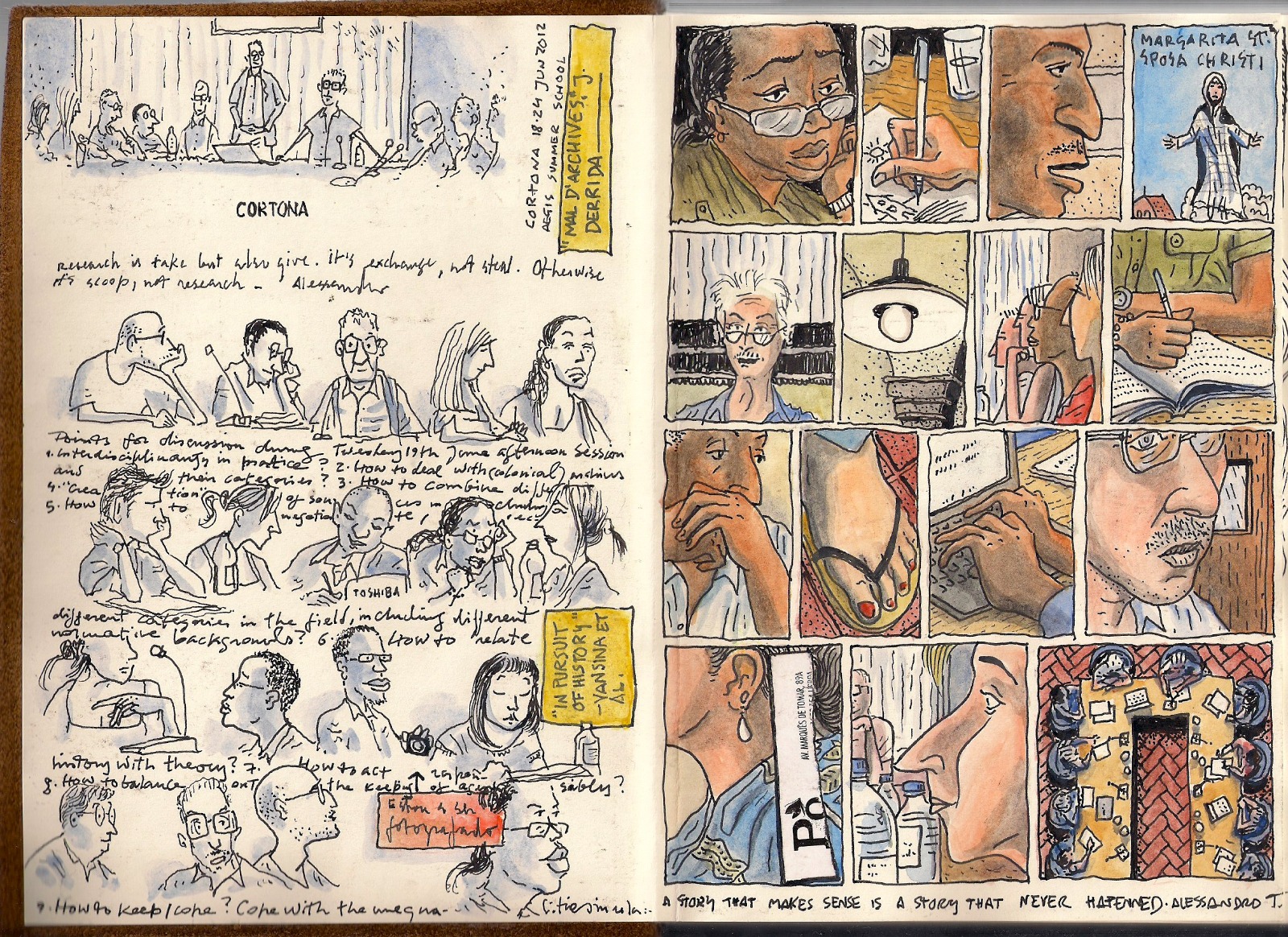The 2012 summer school will focus on the theme of African Dynamics in the Global World and will be addressed in interdisciplinary panels dealing with sub-topics such as consumption, public spaces and policies, and multilevel conflicts and mediations. Other topics may be proposed, and approaches to each of them from a variety of disciplines are encouraged. The aim is not merely to address the effects of globalization, but also to examine the dynamics of African societies, politics, cultures and histories in a manner that is sensitive to wider comparison and articulation. The programme will be articulated into thematic sessions coordinated by a senior researcher and/or an AEGIS Centre with particular interest in the thematic.
The 2012 Summer School is organized by AEGIS-Naples in collaboration with the AEGIS Centres of Bayreuth, Bordeaux, Edinburgh, Gent, Lisbon, and Leiden. The aim of the Summer School is: a) to bring together advanced Ph.D. students and teaching staff from AEGIS Centres in order to exchange field and research experience; b) to improve the students’ ability to prepare and present their research in an international context; c) to promote graduate training within AEGIS and stimulate African-European inter-university cooperation.
Both students and senior researchers are expected to present papers on their current research. The emphasis will be on field methodology and comparative research results, both in writing and oral presentation.
PROGRAMME
Arrival and registration: Monday June 18, afternoon, Hotel Oasi, Via Le Contesse 1, Cortona.
Working sessions: Centro S. Agostino, Via Guelfa 40, Cortona, from Tuesday 19 to Saturday 23 June. Morning Sessions: 9,30-13,00 – Afternoon Sessions: 14,30-18,00
Tuesday, 19 June Ore 9,30
Opening and greetings by the organizers and Dr. Andrea Vignini (Mayor of Cortona)
Morning and Afternoon
PANEL 1. RESEARCH METHODOLOGY
Chairs: Achim von Oppen (Universität Bayreuth) / Alessandro Triulzi (Università di Napoli “L’Orientale”)
(Plenary)
Wednesday, 20 June, Morning
PANEL 2. PUBLIC SPACES AND POLICIES
Chair/discussant: Antonio Pezzano (Università di Napoli-L’Orientale)
- CROESE Sylvia (Stellenbosch University, South Africa) Governance in post-war urban Angola: the case of residents’ committees in Zango.
- EYEBIYI Elieth (University of Abomey-Calavi, LHME/EDP, Benin), The dynamics of the fight against corruption in Benin: the commitment of the media and civil society against the State. / Les dynamiques de la lutte contre la corruption au Bénin: l’engagement des médias et de la société civile face à l’Etat.
- NALLET Clélie (LAM Bordeaux, France), The “Ethiopian Middle Class”: New Social Force and New Stabilising Power for the Ruling Party?
- SOARES Rodolfo Daniel Martins (ISCTE-IUL, Lisboa, Portugal), The implications of Addis Ababa’s development.
Wednesday, 20 June, Afternoon
PANEL 3. TRADITION, SOVEREIGNTY, INSTITUTION-BUILDING
Chair/discussant: Maria Cristina Ercolessi (Università di Napoli “L’Orientale”)
- ANDREETTA Sophie (University of Liège, Belgium), “Tradition first”: Inheritance conflicts and legal pluralism in Benin
- JANSSON Johanna (Roskilde University, Denmark) Same, same but different: China, the IMF and neoliberal financing practice in DR Congo
- SVABLOVA Alžběta (BIGSAS, Bayreuth, Germany) Aspects of post-conflict institutional architecture in Liberia
Thursday, 21 June, Morning
PANEL 4. LAND AND RESOURCE: CONFLICT AND POLICIES
Chair/discussant: Jon Abbink (ASC Leiden)
- DE SIMONE Sara (Università degli Studi di Napoli L’Orientale, Naples, Italy), Land leases in South Sudan: Investments and survival in Central and Western Equatoria States
- GARDINI Marco (University of Milano Bicocca, Italy), Changing Forms of Land Access in South-Western Togo
- MAROWA Ivan (University of Bayreuth, Germany); Spaces of dispossession: Power, policies and discourses of development in colonial Zimbabwe.
- KOFFI Alexis (University of Bouaké, Côte d’Ivoire), Natural resource governance issues at the heart of the fight against poverty along the rural-urban continuum in Tiassalé, Côte d’Ivoire / Gouvernance des ressources naturelles au cœur des enjeux de lutte contre la pauvreté le long du continuum rural-urbain à Tiassalé
Thursday, 21 June, Afternoon
PANEL 5. CONFLICT, POLITICAL AND SOCIAL TECHNOLOGIES
Chair/discussant: Manuel João Ramos (ISCTE-IUL, Lisboa, Portugal)
- DIALLO Fatima (Leiden University, Netherlands), “Governing rebellion”: violence oligopoly as technology of governance in Lower-Casamance (Senegal).
- MERRON James Lawrence (Stellenbosch University, South Africa – Basel University, CH), Making Money Grow on Trees: Trust and technologies of transformation in the South African countryside
- BISHOP Stephanie Ann (University of Basel, Switzerland), Feminism and technology studies as theoretical framing for the urban waterscape
Friday, 22 June, Morning
PANEL 6. HISTORICAL REPRESENTATIONS AND CHANGING PUBLIC SPHERES
Chair/discussant: Achim von Oppen (Universität Bayreuth)
- TSURUTA Aya (University of Edinburgh, UK), Embracing the Past: Dynamics of History-Making and Remembering in Rwanda
- TIQUET Romain (Humboldt Universität, Berlin, Germany), A new approach to forced labour analysis: labourers’ resistance and adaptation on a coercive system in the Senegalese context – 1930-1946.
- KALENGA NGOY Pierre (University of Leiden, NL), The pre-colonial long-distance trade in Katanga and its consequences
- MATHYS Gillian (Ghent University, Belgium), Of Trees, Territory and History: mwami Rwabugiri and the expansion of the Rwandan kingdom in the Lake Kivu region
- UZAR Esther (University of Basel, Switzerland), How can we measure “authority” in the study of public debates and political opinions in the Zambian Copperbelt?
Friday, 22 June, Afternoon
PANEL 7. CONSUMPTION
Chair/discussant: Paul Nugent (University of Edinburgh)
- ESCUSA Elodie (LAM Bordeaux, France), Negotiating class and community identities’ boundaries: the “food shopping” practices of Black middle classes in post-apartheid Johannesburg
- VAN HALEN – PEŠA Iva (Leiden University, NL), From locally manufactured to store-bought goods: Changing appearances and continuities behind patterns of consumption in Mwinilunga District, Zambia
- MKUMBUKWA Abdallah Rashid (Bayreuth University, Germany), Traditional Healing and the Consumption of Marine Resources during the British Colonial Era and Postcolonial in Zanzibar – Tanzania
Saturday, 23 June, Morning
Final general discussion on the school and future organisation

